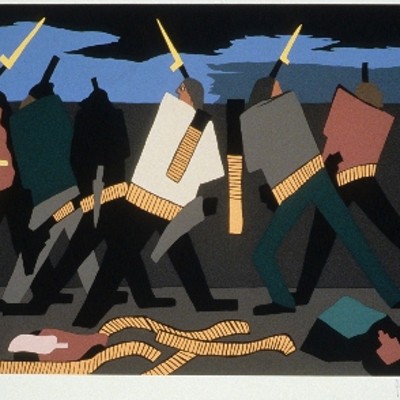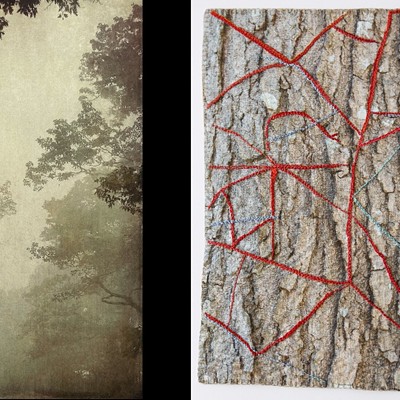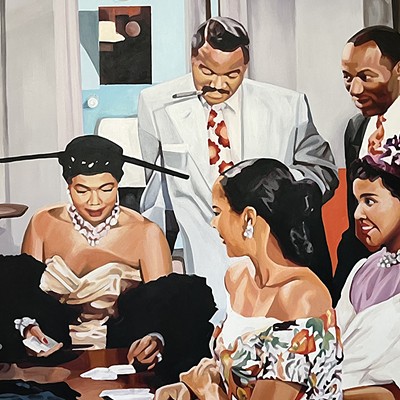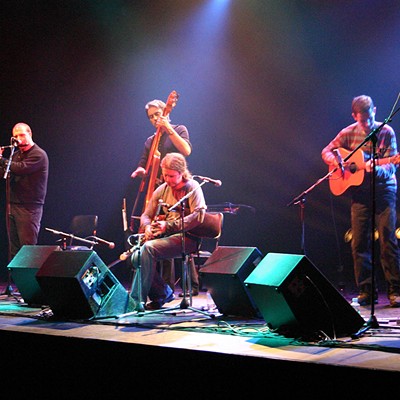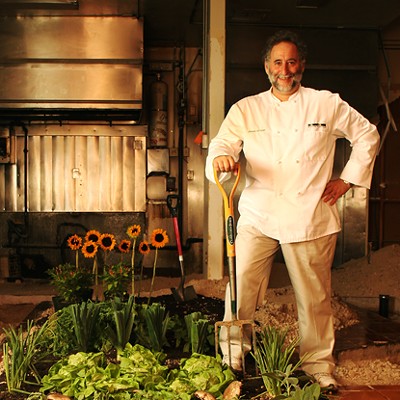The moonlight silhouettes a small mountain peak and lights up a ramshackle trailer and a tarp shelter pitched in a dry wash nearby. A couple of banners flap in the night breeze, one emblazoned with a green cross, the other with two blue drops of water, signaling that this is a No More Deaths desert camp. The buzzing cicadas add to the flags' clatter, but the noise doesn't stop the camp's two volunteers from turning into their cots for their night under the stars.
It's only 9 p.m., but Erin Durant and Daniel Strauss will be up early, by 5 or 6 the next morning. And they've just finished up a long day. Besides their usual patrols out into the desert, in search of border crossers in need of food, drink or medical help, they've given a trio of media interviews. First up was Univision television from Mexico, next a national Fox News team out of Los Angeles, and finally a couple of locals from the Tucson Weekly.
Then, at dinnertime, no fewer than 64 high school students from a Chicago church group showed up with some welcome burritos and plenty of questions about why exactly Durant and Strauss are camping out in the desert during a blistering Arizona summer.
"We were moved by the injustice of our (U.S.) policies and about the plight of people who have to make the journey across the desert," Strauss tells the high school kids.
That's the complicated answer. The simple one is that Strauss, Durant and dozens of other rotating volunteers for No More Deaths are trying to keep people from dying. Durant tells the students that in the endless tallies of bodies found in parched Southern Arizona, "What's lost is the human component."
Both she and Strauss first learned about the immigration crisis on a Colorado College study trip to the borderlands in the spring. Financed by a grant from the college that pays their living expenses, they came back to Arizona with six other students, joining dozens of others volunteering for No More Deaths. Less an organization than an enterprise, No More Deaths was put together by a loose coalition of activist and religious groups, including Borderlinks, Derechos Humanos and Humane Borders in Tucson, and the Migrant Center in Altar, Sonora.
The summer-long campaign is modeled on the Mississippi Freedom Summer of 1964. The freedom riders headed south to register blacks to vote; the No More Deaths volunteers are trying to reduce--if not stop--the numbers of migrants who will perish this year in the Southern Arizona deserts. Rob Daniels of the U.S. Border Patrol says his agency has recorded 22 deaths in the Tucson Sector in June alone, with nine of those dying from heat exposure. (The official fiscal year count, since Oct. 1, is 61, but those are just the bodies the Border Patrol finds. Independent tallies are already more than 100.)
The campaign kicked off Memorial Day weekend with a march that went all the way from the border crossing at Sasabe to Tucson (see accompanying story).
"The heat was pretty intense," says Strauss, who walked with the group. "Out in the sun, you feel you're trapped with nowhere to go."
After the march, organizers set up two camps, one near Arivaca, the other near Why, with plans to operate them until Labor Day. They've had a couple of hitches so far. The Why camp has been temporarily suspended, Strauss says, because pronghorn mating season prevented desert patrols, and last weekend, the Arivaca camp was to be moved from the wash to higher ground in anticipation of the monsoon rains.
Humane Borders and the Samaritans have been coming out into the desert the last couple of years to set up water stations and to patrol for migrants in trouble. But frustration with the continuing deaths led organizers to establish the camps as a round-the-clock presence in the desert. The idea is that the camps can serve stricken travelers 24/7 and also educate local ranchers and townsfolk about their plight.
"A huge part of what we're doing is trying to get the (local) community involved," Durant says. Some neighbors have already pitched in, sending lost migrants to the camp for help. No More Deaths needs all the help it can get.
"The desert is huge," Durant says. "It's random who we can find to help."
Sometimes, locating a needy migrant is like finding the proverbial needle in a haystack. On this particular day, the idealistic young volunteers have done a whole lot of educating--of the media and the visiting teens--but they've found not a single traveler in need of their water or tuna fish or granola bars or applesauce. It's not for lack of trying. Today, as everyday, they have twice driven the local roads on hours-long patrols and tramped into the desert on foot, repeating the Samaritan mantra, "Somos amigos. Tenemos agua y comida. (We're friends. We have water and food.)"
Strauss estimates that in the three weeks since the volunteers opened the Arivaca camp, they've aided maybe 50 migrants, a small fraction of the estimated numbers who walk the desert each day. By contrast, on an average day this June, the Border Patrol picked up 1,418 illegal migrants, according to Daniels.
"We'll sit here two or three days and don't come across anybody," Durant says. "Then in one day, we'll have the media, the Border Patrol and migrants."
One day, a walk into the desert yielded seven dehydrated migrants who had been too afraid to answer the Samaritan call the day before, she says. After getting food and drink from the volunteers, they continued on their way. Sometimes, migrants weary of the trail just want the No More Deaths crew to turn them into the Border Patrol.
Only a few migrants have shown up at the camp.
One was an 18-year-old "boy with a broken arm, traveling with his brother," Durant says. He called to a Samaritan vehicle on the road, and the driver brought him to the camp. "They hadn't had food or water for two days," Durant remembers. "I splinted the arm and immobilized it," then another volunteer drove the boy to a hospital in Tucson.
The No More Deaths volunteers, who spend one-week rotations in the camp, are trained to stay within the law.
"We have a lawyering team that has our back," Strauss says. It's illegal to "aid and abet" people who are breaking the law, but the volunteers are permitted to provide humanitarian aid, including food, water and first aid, and to transport migrants to hospitals if they need serious medical care. But the volunteers can't drive healthy migrants anywhere.
"We tell them we can't give them a ride," Strauss says. "It's against the law and we'll go to jail."
No More Deaths and the Border Patrol had a meeting about procedures before the camp opened.
"We going to continue operations as always in those areas, but we're not going to sit around the camps and wait," Border Patrol spokesman Andy Adame says. "But if we do come across undocumented aliens, we'll question them as usual." That said, he adds, he thinks that the camps run the danger of offering migrants false hopes that the desert is safer than it really is.
Just after dawn the morning after the big high school visit, Strauss pulls himself from his outdoor cot. He grabs a quick breakfast and loads up his SUV, which still bears plates from his native New York. Durant stays behind, taking command of the camp.
Bouncing on the roller-coaster dirt roads in the early-morning light, Strauss swerves around a snoozing snake and dodges some swooping buzzards. As he passes through quaint Arivaca, part hippie haven, part ranch town, he gets a mixed reception. When Jack Baker spots the Samaritan logo on Strauss' car, he rushes out the door of Double L Feeds, and angrily shakes both hands in the air, ominously raising the middle finger on each. One block up, another local, who repaired Strauss's tire the week before, gives a friendly wave.
"People out here with ranches and houses get migrants all the time," Strauss says. "They don't know what to do. We're going to have a community dinner event on July 9. The guy who gave us the finger probably doesn't know what we're doing. We'll get together just to inform them."
Interviewed later, a furious Baker says he's already well informed about the migrants.
"They leave behind millions of water bottles," he says. "Cowboys are fixing their fences all day. Calves get shredded going through the holes in the barbed wire," cut by migrants. Baker has his own solutions, too. "It should be legal to shoot them. Illegal is illegal. These assholes (volunteers) are making it tougher on us. If those kids had a job they wouldn't have time to do this."
Baker has a point about the trash. Water bottles litter the roads. West of town, Strauss stops at a wash that's a pick-up point for migrants meeting their rides. Generously sheltered by mesquite trees that give good coverage to walkers hiding from the Border Patrol, the wash is filled with all kinds of junk--everything from abandoned shirts, pants and backpacks, to diapers, toothpaste and the ubiquitous plastic water bottles.
"We see it as part of our mission to clean it up," Strauss says. And the rubbish gives the volunteers valuable information about popular trails. They had cleaned up this particular wash just two weeks before, Strauss says, so the fresh debris tells him it's still being heavily used. Some volunteers argue they should leave at least some trash on the land, he says, because its serves as trail markers for the migrants still to come.
On another trail, out in the open scrubland east of jagged Baboquivari peak, somebody has carefully tied a plastic bag to a spindly tree, leaving a message indecipherable to outsiders.
It's only about 8:30 a.m., but the heat is already searing. By midday it will climb to 102 degrees. This trail is relatively pristine, but hundreds of migrant footprints are traced in its dirt. Strauss calls out the No More Deaths mantra again and again, hoping he'll find some migrants hidden in the few mesquites that flourish in this grassland.
"Somos amigos," he yells. "Tenemos agua y comida."
But nobody answers.
Back out on the open road, Strauss passes one Border Patrol SUV after another. Sometimes, he and the agents even wave to each other; they have at least one thing in common. Both sides are doing the same work, for different reasons--searching for people who doing their best not to be found.

